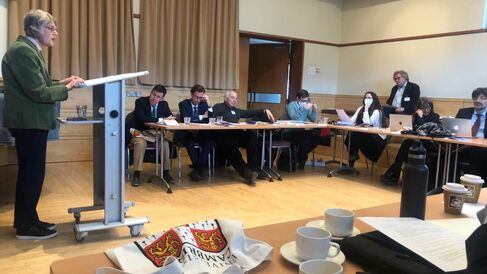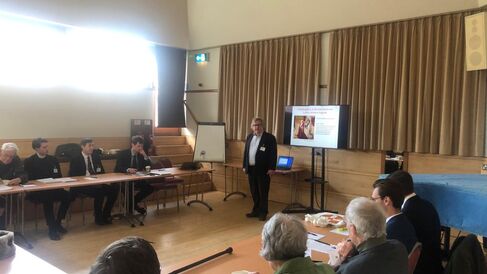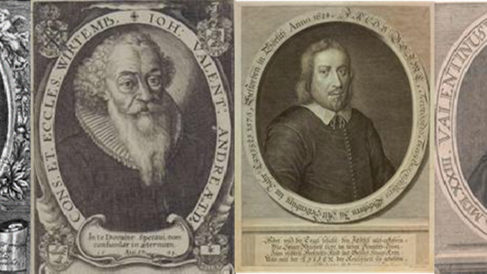
THE RECEPTION OF
GERMAN MYSTICISM IN
EARLY MODERN ENGLAND
University of Cambridge
Clare College
McGill University
International Conference sponsored by the
The Cambridge Centre for the Study of Platonism
and the School of Religious Studies, McGill University
Clare College, Cambridge, 6—8 April 2022
PROGRAMME
WEDNESDAY, 6 April
18h00 Welcome Drinks
Old Hall,The Queens’ College
THURSDAY, 7 April
BENNETT ROOM, Memorial Court, Clare College
9h00 First Plenary: Late-medieval mystical antecedents
Garth Green
McConnell Professor of the Philosophy of Religion and Director of the School of Religious Studies (McGill University)
Nicholas of Cusa’s Platonism: its Epistemological Structure and Historiographical Significance
9h50—10h00 Morning Coffee—Bennett Anteroom
10h00—12h00First Panel—Nicholas of Cusa and his Legacy
Chair: Douglas Hedley
Professor of the Philosophy of Religion, Cambridge University
10h00—10h30 James Bryson (Ludwig Maximilian University, Munich)
Love, Beauty, and Friendship in the Mystical Theology of Nicholas of Cusa
10h30—11h00 Denis Robichaud (Notre Dame University)
Cusanus and the Dionysian Question
11h00—11h30 Mathew Nini (McGill University)
John Everard, reader of Nicholas Cusanus
11h30—12h00 Discussion
12h30 Luncheon
The Buttery, Old Court, Clare College
14h00—15h00 Second Plenary: Cambridge Platonism
Douglas Hedley(Clare College)
Between Pascal and Spinoza? Faith, Reason, and the Cambridge Platonists
15h00—17h30 Second Panel—Henry More and Enthusiasm
Chair: Daniel Tolan
Postdoctoral Fellow, Centre for the Study of Platonism
15h00—15h30Benjamin Crosby(McGill University)
“Full of life and marrow” or “dangerous Book”? The Theologia Germanica in Seventeenth-Century England
15h30—16h00 Bogdan Deznan (University of Bucharest)
God within – Henry More and the Context of 17th-Century English Experiential Christianity
16h00—16h30 Chance Woods (Baylor)
The Revelation of Matter: Henry More’s Confrontation with Jacob Böhme
16h30—17h00 Marilyn Lewis(University of Bristol)
Questions Concerning Enthusiasm: Henry Maurice’s Reception of Henry More’s Critique of Jacob Böhme
17h00—17h30 Discussion
17h30 Guided Visit to the Chapel of Christ’s College
19h00 for 19h30 Drinks in the Fellows’ Garden and Conference Banquet
Latimer Room,Old Court,Clare College
20h30 A Musical Offering, Clare College Chapel
FRIDAY, 8 April
8h30—10h30 Third Panel—From Eriugena to Eckhart to England
Chair: James Bryson, Humboldt Fellow, Ludwig Maximilian University, Munich
8h30—9h00 Adrian Mihai (Clare Hall, Cambridge)
Eriugena’s Periphyseon: Its German Reception via England
9h00—9h30 Rebecca Coughlin(McGill)
“Concerning the unconceiveableness and utter incomprehensibleness of the Deity”: Henry More’s critique of Meister Eckhart’s apophatic theology
9h30—10h00 Jure Zovko (Zadar)
Fides versus experientia—Isaac Newton under the influence of mystical doctrine
10h00—10h30 Discussion
10h30—11h00 Morning Coffee—Bennett Anteroom
11h00—13h00Fourth Panel—Behmenism in England and Germany
Chair:Torrance Kirby, Professor of Ecclesiastical History, McGill
11h00—11h30 Christian Hengstermann (Wuppertal)
The androgynous Adam and the pre-existence of the soul—Jacob Böhme’s XL Questions or Psychologia vera in the Cambridge Behmenists and the Cambridge Origenists
11h30—12h00 Jan Rohls(Ludwig Maximilian University, Munich)
John Pordage and his Behmenist Metaphysics
12h00—12h30 Lise Zovko(University of Zagreb)
Spinozism and “Behmenism” in Henry More and Anne Conway
12h30—13h00 Discussion
13h00Luncheon
The Buttery, Old Court, Clare College
14h30—16h00 Fifth Panel—Mysticism in Literature & Liturgy
Chair: Louise Hickman
Reader in Philosophy of Religion, Newman University
14h30—15h00 Anna Lewton-Brain (McGill and Dawson College)
Music and Mysticism in the Poetry of George Herbert
15h00—15h30 Torrance Kirby (McGill and Cambridge University)
Sursum Corda: Metanoia and Sacramental Presence
15h30—16h00 Discussion
16h00 Farewell Tea—Bennett Anteroom
16h30 Guided Visit to the Chapel of Emmanuel College
Pub Crawl—the Clarendon Arms
Acknowledgements
The Conference Steering Committee thank the following
for their support:
Clare College
Cambridge Centre for the Study of Platonism
University of Cambridge
McGill University - The School of Religious Studies
Social Sciences and Humanities Research Council of Canada
www.sshrc-crsh.gc.ca
Research Team Members
Dr James Bryson,Humboldt Postdoctoral Fellow, Ludwig Maximilian University of Munich
Dr Simon Burton,Senior Lecturer in Reformation History, University of Edinburgh
Mr Benjamin Crosby, PhD candidate, McGill University
Dr Garth Green, McConnell Professor of the Philosophy of Religion, McGill University, Montreal (co-applicant)
Dr Michael Hawkins, Digital Humanities, Cambridge Platonists Project, Cambridge University
Dr Douglas Hedley, Professor of the Philosophy of Religion, Cambridge University (co-applicant)
Dr Christian Hengstermann,Lecturer in Theology and Classics, Ruhr University Bochum, Germany
Dr Louise Hickman,Reader in Philosophy of Religion, Newman University, Birmingham
Dr Joshua Hollmann,Professor of Theology, Concordia College, New York
Dr Evan King,European Research Council Postdoctoral Fellow, University College, Dublin
Dr Torrance Kirby, Professor of Ecclesiastical History, McGill University, Montreal (PI) and Visiting Fellow, Clare Hall, Cambridge
Dr Adrian Mihai, Research Fellow, Clare Hall, Cambridge University
Dr Cecilia Muratori,Research Fellow, Queen Mary University of London
Mr Mathieu Nini, PhD candidate, McGill University
Dr Eric Parker, Research Assistant, McGill University, Montreal
Dr Jan Rohls,Professor emeritus of Philosophy of Religion, Ludwig Maximilian University of Munich
Dr Daniel Tolan, Postdoctoral Fellow, Centre for the Study of Platonism, Cambridge University
Dr Marie-Élise Zovko,Tenured Research Fellow, Institut za filozofiju, University of Zagreb, Croatia
Conference Steering Committee
Garth Green
Douglas Hedley
Torrance Kirby
The Reception of German Mysticism in Early Modern England
Research Précis
The project consists in establishing the fundamental influence of German or Rhenish mysticism on English religious thought, chiefly in the 17th-century. The English reception of such German mystical authors as Meister Eckhart (c. 1260-1328), the anonymous author of Theologia Germanica, Johannes Tauler (c. 1300-1361), Nicholas of Cusa (1401-1464), Sebastian Franck (c. 1499-1542), Hans Denck (1500-1527), Valentin Weigel (1533-1588), and Jakob Böhme (1575-1624), to mention just the most significant representatives of this tradition, has been hitherto little studied, or not studied at all. There are some notable exceptions, particularly the research of Douglas Hedley on the exceptional role of the Cambridge Platonists, especially of Henry More, in the dissemination of German mysticism in England in the seventeenth century. This project will not only reconstruct for the first time the wide-ranging reception of these German thinkers in Early Modern England, but also show that it was through this reception that the influential tradition of 'German mysticism' was first created. For instance, while in 17th-century Germany the writings of the main figure of this tradition, Jakob Böhme, went underground because of accusations of heresy, in England they were keenly translated, commented upon, and considered in relation to other German writers who had also been translated at the same time, specifically Sebastian Franck and Valentin Weigel. Through their work, the English readers thus established a lineage that connected these thinkers, and that at the same time created a philosophical bridge between England and Germany. The project will highlight the international legacy of these authors by adopting the perspective of historico-philosophical engagement with the sources, placing them also in the theological milieu of their time.
ABSTRACTS
James Bryson, Ludwig Maximilian University, Munich
Love, Beauty, and Friendship in the Mystical Theology of Nicholas of Cusa
Contemporary philosophers and scholars lament what they see as the postmodern divorce of art from beauty, arguing that the culture assumptions lying behind this divorce are anticipated by Plato’s theory of beauty in the Symposium, the theory lying behind the expulsion of the poets from his ideal city.The thrust contemporary criticisms of Plato’s theory of beauty is that it is motivated by a fear of beauty’s erotic power, requiring the soul to turn away from the beauty of the world to a life of contemplation, a life ultimately inaccessible to embodied creatures. Beauty thus loses its most important characteristic with Plato – the power to offer consolation to the incarnate subject.In his paper, I will attempt to answer these all-too-common criticisms with reference to the Christian Platonism of Nicholas of Cusa, who represents both the culmination and a new beginning of the Platonic tradition in the Latin West, one that would go on to influence its reception in early modern England. I wish to make my case for the close relationship of love and beauty in the Platonic tradition through a reflection on Cusanus’ understanding of these themes as they are expressed in hisDe Visione Dei. Special attention will be paid to the mediating role of friendship.
Rebecca Coughlin, McGill
“Concerning the unconceiveableness and utter incomprehensibleness of the Deity”: Henry More’s critique of Meister Eckhart’s apophatic theology
In The Immortality of the Soul, Henry More levels a direct critique of Later Platonism’s insistence of our inability to know God in God’s essence, especially as it is taken up by the medieval Christian tradition. For Eckhart, as for many before him, there exists a limit to our intellectual knowledge of God, not due to any fault in God, because of a failure of our intellectual capacity. This recognition sparks the tradition of apophatic or negative theology within Later Platonism; it is this line of thinking that More seems to be attacking when he writes that the stupidity of superstitious men concerning “the inconceivableness and utter incomprehensibleness of the Deity” has prejudiced men against knowledge of God who do so “by way of a devotional exaltation of the transcendency of his nature” (Immortality, VI.21). More on the other hand offers that he is: “not at all stick to affirm, that His Idea or Notion is as easy as any Notion else whatsoever, and that we may know as much of him as of any thing else in the world” (Ibid.). Determining influence in the history of ideas is often as much about determining sources as it is about establishing which ideas or lines of thought later thinkers were working in contrast to. This paper will examine how More used Later Platonism’s apophatic theology, as found in Eckhart, as a foil when developing his own thinking on our ability to attain true knowledge of God.
Benjamin Crosby, McGill
In 1854, Susanna Winkworth published an English translation of the anonymous fourteenth-century mystical text the Theologia Germanica. Both the preface by the well-known priest and professor Charles Kingsley and Winkworth’s own introduction take care to establish its Protestant and broadly orthodox Christian bona fides, noting in particular Martin Luther’s endorsement and translation of the work. They express relief that it is finally available to benefit the souls of English Christians. But left unsaid by both Winkworth and Kingsley is that the Winkworth translation was not this text’s first introduction into England – and that it was circulated some two hundred years before not as a safely orthodox devotional book but as a highly controversial text associated with outré forms of nonconformity. In this paper, I will examine the seventeenth-century reception of the Theologia Germanica in England, tracing its promulgation by the radical preachers John Everard and Giles Randall, its condemnation by anti-Familist polemicists, and finally its cautious endorsement by Cambridge Platonist Henry More. I will argue that the Theologia Germanica first enters English Christianity as an Enthusiast text amid a debate about the role of ‘Enthusiasm’ in the Christian life, a debate in which the Protestant and orthodox bona fides established by Winkworth figure not at all. Uncovering this prehistory of the Theologia Germanica in England not only deepens our understanding of the English reception of this pivotal mystical treatise but also sheds light upon the formation of the category of ‘German mysticism’ amidst the ecclesial strife of seventeenth-century England, a category in which this book plays a pivotal role.
Bogdan Antoniu Deznan, University of Bucharest
God within – Henry More and the Context of 17th Century English Experiential Christianity
Early modern England was the setting for a fertile engagement on the part of some scholars and theologians with Reformed spirituality emanating from the German sphere. Indeed, works such as the Theologia Germanica and the writings of Jacob Boehme found favor in certain intellectual circles which endeavored to make them accessible to a wider audience. The dissemination of this corpus was accomplished by translations into English and, in respect to its content, by the appropriation of themes and features specific to these writings in some of the theological and philosophical literature of 17th century England. Of course, these efforts did not go unnoticed and unchallenged by the mainstream clergy who denounced the advocates of such theological views as enthusiastic and heterodox.
The Cambridge Platonist, Henry More, while by no means a proponent of religious enthusiasm was nevertheless profoundly preoccupied with articulating a theology that goes beyond mere dry speculations and provides a framework for assessing the experiential dimension of Christianity. It is not an exaggeration to state that overall, the chief objective of More’s intellectual project was soteriological. The emphasis on lived religion together with the preoccupation with the dynamics of man’s salvation explain More’s high valuation of the Theologia Germanica and the precise aspects of this treatise that he found so compelling. In this More was not alone as other contemporaries were drawn to the work’s soteriological message. Thus, More’s considerations regarding man’s salvific destiny (which are comprised of his anthropological and Christological views) will be discussed in conjunction with the writings of Giles Randall, John Everard, and the anonymous tract, The Life and Light of a Man in Christ Jesus. This contextual reading of More will highlight important points of agreement with these authors considered as heterodox, but also the limits of this common ground given More’s theological predilections.
Garth Green, McGill
Nicholas of Cusa’s Platonism: Its Epistemological Structure and Historiographical Significance
This paper attempts to set out the basic structure of Cusanus’ philosophical theology by means of an exposition of the work that best defines its neo-Platonic character, the Apologia doctae ignorantiae (ADI; 1449). In this text, Cusanus depicts his reception and recapitulation of an explicitly “neo-Platonic” tradition, and his rejection of a distinct “neo-Aristotelian” tradition. Cusanus makes this distinction with respect to both the basic principles of each, and to their relative predominance in his own historical moment. In both of these contexts, Cusanus asserts a relation of contestation and competition rather than concordance between these two traditions – regarding both their methods, and their concepts of God – that becomes essential to the basic structure and significance of the neo-Platonic character of his theology.
Douglas Hedley, Clare College, Cambridge
Between Pascal and Spinoza? Faith, Reason, and the Cambridge Platonists
There has been much discussion about the Cambridge Platonists in recent years about the value of the designation in relation to 17th Cambridge intellectual life. Dimitri Levitin has attempted to deny the existence of the group; Marilyn Lewis has explored and established the close tutorial links between the key figures and their students, and posited a convincing web of patrons and pupils. I wish to add some weight to Marilyn’s argument by exploring the shared philosophical theology. Somewhat schematically, I describe this as standing between Pascal and Spinoza. By this, I mean that the Cambridge Platonists pursue the God of the philosophers but not in the manner of Spinoza, while their collective view of the mysteries of faith is quite distinct from the strategy of belief proposed by Pascal.
Christian Hengstermann, Wuppertal
The androgynous Adam and the pre-existence of the soul - Jacob Böhme's XL Questions or Psychologia vera in the Cambridge Behmenists and the Cambridge Origenists
Jacob Böhme’s XL Questions was the first of the German mystic’s major works to be translated into English by the prolific circle of English Behmenists. Its major figure, the polymath and Leveller lawyer John Sparrow, provided a readable English translation of the Teutonic Philosopher’s vision of a soul proceeding from the ineffable depths of the divine abyss. Böhme’s depiction of an androgynous Adam married to the Father’s all-encompassing Sophia sparked off a major debate between two celebrated Cambridge philosophers, the Behmenist Charles Hotham and the Origenist Henry More. In 1646, Hotham drew on Sparrow’s translation of Böhme’s XL Questions to provide a cosmology of God’s life-giving ubiquity in animate space, defending it publicly at a historic Behmenist commencement. The soul is shown in detailed metaphysical speculation to be engendered by a spirit of nature emerging from the omnipresent divine Sophia. Hotham’s treatise, published in two widely-differing Latin and English versions in 1648 and 1650, marked the beginning of English Behmenism. In belated response, the Cambridge Origenist Henry More provided a Neoplatonist reading of Böhme in his 1668 Epistle about Ja. Beh. in which the eponymous shoemaker philosopher and mystic is revealed to propound an occasionally flawed, yet deep, vision of the ancient theology.
Torrance Kirby, McGill
Sursum Corda: Augustinian hermeneutics of sacramental presence in the English Reformation
Among the polemical issues to arise in the religious controversies of the 16th century, perhaps the most contentious of all concerned the Sacrament of the Eucharist. The received medieval account of sacramental presence according to the doctrine of Transubstantiation had been promulgated at the Fourth Lateran Council in 1215 and reaffirmed by Trent in 1551. Dogmatic affirmation of ontological conversion of the physical elements of the sacrament (Latin: transubstantio; Greek: μετουσίωσις) became a key focus of Tridentine deliberation and occasioned sustained controversy throughout the Reformations and Counter Reformations of the sixteenth century and later. In England Stephen Gardiner responded to escalating attacks on sacramental “real presence” by an evangelical avant-garde as well as by a phalanx of continental divines, among them Huldrych Zwingli of Zurich and the Florentine Peter Martyr Vermigli. Echoing Augustine in his Tractatio of 1549, Vermigli asserted presence apprehended ‘by faith alone’ which demanded a subjective grasp of transcendent reality beyond the corporeal limits of the sacramental object itself. Two editions of a sacramental treatise by the 9th-century Carolingian Augustinian theologian, Ratramnus of Corbie, were published in 1548 and 1549 in English translation by Nicholas Ridley, Bishop of London. In the wake of Elizabeth Tudor’s accession to the throne, Vermigli’s Augustinian “instrumental realism” was taken up in 1559 by his disciple John Jewel in his ‘Challenge Sermon’ at Paul’s Cross, which in turn shaped Richard Hooker’s sacramental hermeneutics. This paper will address this 16th-century controversy over the conversion of the Host and the implied ontology of “presence” with a view to exploring the metaphysics of early-modern hermeneutical reflection on the relation of “signs” to “things signified”.
Marilyn A. Lewis, Bristol University
Questions Concerning Enthusiasm: Henry Maurice’s Reception of Henry More’s Critique of Jacob Böhme
The Cambridge Platonist philosopher Henry More’s Philosophiæ Teutonicæ censura (1679) allowed that Jacob Böhme was a good and pious man but severely criticised both his cosmology and his belief that he was divinely inspired. This article looks at the influence of More’s text on Henry Maurice’s An Impartial Account of Mr. John Mason of Water Stratford, and his Sentiments (1695). Maurice was a younger member of More’s tutorial family at Christ’s College, Cambridge, and his text shows that he had a copy of More’s Censura before him as he wrote. The four questions answered by Maurice largely mirror those asked by More’s interlocutor, and the replies of the two writers show considerable similarity. Both More and Maurice carefully examined what evidence they could find for the life and moral tenor of their subjects. They both found their subjects to be suffering from melancholy, a physical and mental illness which distorted their evaluation of what they supposed to be divine visions. But while More found Böhme harmless and actually useful in bringing others to piety, Maurice found Mason culpable for insisting on Calvinist predestination to the point of antinomianism and for founding a sect outside the established Church of England. Maurice’s Impartial Account is evaluated here with reference to the changing intellectual climate of the late seventeenth-century, when tutorial descendants of the original group of Cambridge Platonists were employing the evaluative tools acquired during their education under More’s auspices to combat both enthusiasm and sceptical atheism.
Anna Lewton-Brain, McGill
Music and Mysticism in the Poetry of George Herbert
Music, for George Herbert, offered the most immediate and powerful mode of mystical ascent of the soul towards union with the divine. In his poem, “Church Music,” for example, Herbert describes the ecstatic experience induced by listening to liturgical music: “Now I in you without a body move, / Rising and falling with your wings: / We both together sweetly live and love” (lines 5-7). Likewise, in Herbert’s Latin poetry, one can find similar claims about the transporting power of music, as in “De Musica Sacra”: “Tu Diua miro pollice spiritum / Caeno profani corporis exuens / Ter millies coelo reponis: / Astra rogant, Nouus hic quis hospes?” [You, Goddess [i.e., music], with an amazing thumb releasing / The spirit from the filth of an unholy body, / Return it to the sky three thousandfold: / “Who is this new guest?” the stars inquire] (lines 25-28). Herbert’s descriptions of mystical ascent in his poetry often involve imagery of music and of stars and of winding circularity, which represent union with the eternal and perfect being. This paper investigates Herbert’s musical mysticism and shows how lived experience of music, both singing and listening, were understood to operate as a means of metaphysical ascent. This will broaden the discussion at the conference on German mysticism to contextualize the religious mystical landscape in England at the time of the flowering of translations of and discussion of German mysticism in the mid-seventeenth century.
Adrian Mihai, Clare Hall, Cambridge
Eriugena's Periphyseon: It's German Reception via England
The present paper will look at the reception and legacy of Eriugena’s Periphyseon (c. 866) in German thought, from Thomas Gale’s first printed edition (Oxford, 1681), until the first Modern edition, published in Münster in 1838 by Christoph Bernard Schlüter. The first part of the paper will look at the reception of Eriugena’s magnum opus during the Pantheismusstreit, from 1783 up to its height in 1786. Many, if not all, the authors that took part in this controversy were directly or indirectly influenced not only by Spinoza, as is traditionally asserted, but also by the Cambridge Platonists, especially by Henry More and Ralph Cudworth. The second part will examine Eriugena’s role in the formation and development of German Idealism until 1838 and the reasons and intentions of Schlüter’s publication of a new edition of the Periphyseon. Schlüter had already published a study on Spinoza, and, in the Preface to his new edition of the Periphyseon describes Eriugena as a precursor of German Idealism.
Matthew Nini, McGill
John Everard, reader of Nicholas Cusanus
John Everard was born circa 1575 and received a Doctor of Divinity degree from Clare College, Cambridge in 1619. Deeply learned and steeped in neo-platonic sources as well as German Mysticism, Everard’s intellectual interests were eclectic: drawing from Proclus, Dionysius, Eckhart, Sebastian Castellio, and the Corpus Hermeticum, Everard crafted a unique theology that stands in contrast to the usual positions of a 17th century Cambridge divine. He advocated knowledge of Christ and the Scriptures through experience rather than merely intellectually, proposing a personal inner transformation that would lead to action in the world. This position flirted with antinomianism, and Everard would have to deal with numerous condemnations throughout his career. This paper will claim that the most important influence on Everard’s theology is Nicholas of Cusa. Everard translated no less than three major works of Cusa’s, De Docta Ignorantia, De Visione Dei, and De Idiota. By examining Everard’s translations of these texts, I will seek to establish Cusa’s influence. While it might seem perplexing for a 17th century English divine who came close to anabaptism to have as primary influence a medieval German cardinal of the Roman Church, I will demonstrate that the contradiction is only apparent. Cusa’s emphasis on the individual’s relationship to the whole is both philosophically and ecclesiologically prophetic, and his conception of the local community’s relationship to the universal church is a paradigm that Everard would have seen as more feasible in his own society than in Cusa’s. Finally, the German cardinal’s relationship to language, which plays on the difficulty of translation, how the use of Latin in the Holy Roman Empire was always contextualized by local dialects, and the relation between ineffable experience and the witness born to such experiences within a community, receives voice in the work of Everard, whose goal was always to create the conditions for conversion in a particular social, historical, and linguistic context.
Denis Robichaud, Notre Dame University
Cusanus and the Dionysian Question
A note in Nicholas of Cusa’s personal manuscript of Athanasius contains the reminder to consider whether Athanasius wrote about Dionysius the Areopagite because Ambrose, Augustine, and Jerome ignore him while only later authors mention him, namely Gregory the Great and John of Damascus. The note is a window onto a larger debate on the Dionysian Question among Cusanus’s contemporaries (Valla, Gaza, Balbi, George of Trebizond, and Cardinal Bessarion) and reveals Cusanus’s considerations over the chronology and thus also apostolicity of the Corpus Dionysiacum. In fact, the note closely resembles arguments first made by Cusanus’s acquaintance Lorenzo Valla, which were then circulated widely by Erasmus in Early Modern Europe. But as is clear from his De non aliud and De venatione sapientiae, Cusanus was also familiar with his colleague Pietro Balbi’s discovery that the Corpus Dionysiacum employs similar terminology and concepts as Proclus’s Platonic Theology. Whereas in the De non aliud Cusanus argues that this similarity can be explained by the fact that Dionysius and Proclus both employ a common source, Plato, in the De venatione sapientiae, he instead entertains the notion that Proclus learned from Dionysius and Origen. Cusanus’s thoughts on the Dionysian Question are more than an example of scholarly source criticism. They are part of his efforts to ground both Proclus’s and his own understanding of mystical theology on the mystical experience of Dionysius. This paper examines the Proclean and Dionysian dimensions of Cusanus’s mysticism.
Jan Rohls, Ludwig Maximilian University, Munich
John Pordage’s “Metaphysica”
John Pordage was together with Jane Leade one of the leading British Behmenists also being studied by German followers of the Silesian spiritualist. His Metaphysica only survived in a German translation of the lost English manuscript. It was published in 1715 in addition with an extensive introduction by an anonymous German author who praised it as an adequate instrument to refute Cartesianism, Naturalism, Atheism and Spinozism. My paper will deal with the foundations of Pordage’s own “divine and true metaphysics” as a “science of the invisible and eternal entities” and its German reception by the author of the introduction.
Chance Woods, Baylor University
The Revelation of Matter: Henry More’s Confrontation with Jacob Böhme
As the pioneering studies of Sean McGrath and Cecilia Muratori have recently demonstrated, the theological innovations of Jacob Böhme can genuinely be credited with inspiring the most profound advancements in modern philosophical speculation. McGrath in particular has developed a unique hermeneutic for reading Böhme’s theology of evil and its monumental impact on both Hegel and Schelling, suggesting that it requires a more nuanced understanding of the larger history of esoteric Christianity than many admit. Building on McGrath’s recent work, this paper turns to a unique moment in seventeenth-century England when a polemical exchange between Henry More and Thomas Vaughan revealed abiding tensions between Gnostic and Platonic inflections of Christianity. I argue that More’s writings (both his allegorical poetry as well as his negative appraisals of Böhme’s metaphysical system) disclose very particular reasons for Christianity’s long-running rejections of pantheism. I concentrate on why More found it so hard to accept Böhme’s contention that the material world could be construed as the medium of God’s self-consciousness.
Jure Zovko, University of Zadar
Fides versus experientia—Isaac Newton under the influence of mystical doctrine
Isaac Newton was considered by his contemporaries to be not only the most eminent physicist, but also an insightful and learned theologian (Gale E. Christianson, Herbert McLachlan). He wrote many works that should be classified by today's point of view as occult studies, which were created, among other things, due to the idiosyncratic interpretation of the Bible. The influence of J. Boehme's mystical teachings, which dominated Cambridge at the time of Newton's studies, also had a strong effect on Newton. Although Newton's successors have interpreted his formulation of mechanical laws as the framework for a universe in which God is no longer an essential or even necessary component, Newton himself believed that the universe could not function without the presence of God. Indeed, without the regular intervention of the Creator, the universe would eventually collapse and explode, as long predicted in biblical prophecy. Leibniz put it wittily that God Almighty must wind up his clock from time to time or it would stop moving.
According to deistic views of Newton, God's active intervention is to prevent the planets from falling on each other: “For two planets separated from each other by a long empty [vacui] distance do not attract each other by any force of gravity or act on each other in any way except by the mediation of some active principle [movente principio] interceding between them by which the force is transmitted from one to the other. And therefore those ancients who rightly understood the mystical philosophy taught that a certain infinite spirit pervades all space & contains and vivifies the whole world [spiritum quondam infinitum spatia omnia pervadere & mundum universum continere & vivificare” (Paolo Casini, “Newton: The Classical Scholia,” 38). This paper analyses the mystical and alchemical components in Newton's scientific system.
Lise Zovko, Institute of Philosophy, Zagreb
Spinozism and “Behmenism” in Henry More and Anne Conway
Important characteristics of the reception of German Mysticism in Early Modern England are revealed by its relationship to reception of Spinoza and Spinozism. Both Anne Conway and Henry More reject Spinoza and Spinozism while embracing to a certain extent Jacob Böhme and “Behmenism” – although for somewhat different reasons. In fact, what both More and Conway admire in Jacob Böhme may be shown to be characteristic also of the philosophy of Spinoza, whose similarities to the thought of Jacob Böhme can be traced to their common roots in Platonist and kabbalist thought. Like her friend and teacher, Henry More, expert in Plotinus and Platonist philosophy, Anne Conway regards Spinoza as one of her greatest adversaries. In her Principles, she rejects Spinoza and Spinozism for confounding God and Creatures (Conway 1996, Ch. IX, §3: 64), attributing to Spinoza and “Spinozian philosophy” the same kind of materialism that she decries in Hobbes. Yet both Conway and Spinoza emphasize a monistic view of the highest principle in relation to finite individuals, conceiving that principle as both absolutely transcendent and fully immanent in all that exists. Spinoza and Conway both also differentiate absolute freedom in God or the highest principle, which is one with or constrained only by God’s essence (Conway: “goodness”, the necessity by which God exists), from the type of freedom of which humans, and in Conway’s case, creatures in general are capable. Conway and Spinoza share affinities to Platonist philosophy found in the works of Abraham Cohen Herrera and his philosophical and Platonist interpretation of kabbalah. These works were familiar to both thinkers through distinct and in part overlapping channels. Reception of Herrera’s works forms a unique bond between Conway and Spinoza, despite their never having encountered one another personally, or entered into any kind of direct philosophical discourse with one another. The difference between More’s and Conway’s reception of Behmenism and Spinozism illuminates the differences between their philosophical standpoints – and the reasons for Conway’s greater affinity for Spinoza. In this paper, I will attempt a critical comparison of Henry More’s and Conway’s reception and shared criticism of Spinoza to their reception of Böhme’s thought, in order to shed light on similarities and differences between Henry More’s and Anne Conway’s understanding of God, nature, and human nature.
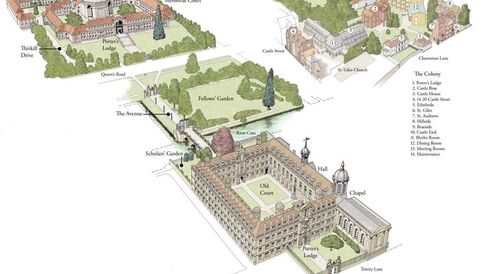
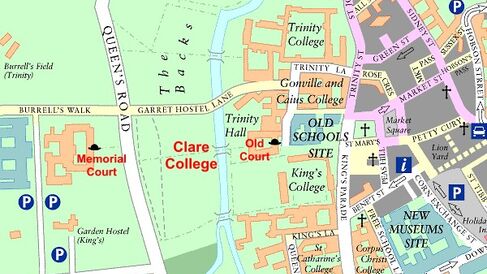
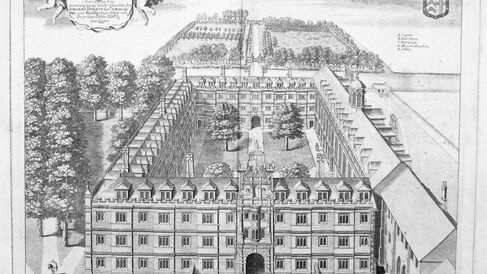
Clare College, engraved by David Loggan (1690)
